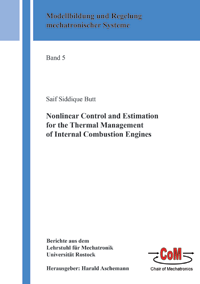
Shop : Details
Shop
Details
45,80 €ISBN 978-3-8440-4862-9Softcover148 pages55 figures202 g21 x 14,8 cmEnglishThesis
November 2016
Saif Siddique Butt
Nonlinear Control and Estimation for the Thermal Management of Internal Combustion Engines
Recent demands for efficient fuel combustion and lower emission of pollutants call for structural changes in the design of engine cooling systems. This especially involves the electrification of the auxiliaries within the engine cooling system. The engine cooling system can be thought of as the integration of the electro-mechanical components providing fluidic and thermodynamic control action. Due to these electrical components, dependencies like the pump volume flow on the motor speed could be varied. This contributes both to efficient fuel combustion and to a reduction in the emission of pollutants.
The control-oriented model envisaged to capture the dominant dynamics of the system is developed based on the first law of thermodynamics. To obtain the nominal model parameters, a parameter identification by means of nonlinear optimization is carried out. For control purposes, the angular velocity of the radiator-fan is considered as the single control input. Thus, heat flows into the ambiance can be controlled by manipulating the angular velocity of the fan.
The work in this dissertation focuses mainly on a tracking control of the engine outlet temperature. To address real scenarios, two operating modes are investigated: In the first operating mode, a desired trajectory for the engine outlet temperature is investigated for a constant heat flow into the coolant. The second operating mode corresponds to the injection of additional heat into the coolant where the engine outlet temperature should be kept constant.
Due to their system dynamic properties, the currently industrial standard gain-scheduled PI controllers cannot meet the requirements for accuracy and robustness. Furthermore, it is cumbersome to tune the control parameters, which are a function of engine speed and engine load. Thus, these nonlinearities and uncertainties have to be addressed properly using model-based nonlinear control approaches. The control design is categorized into two main groups: The first one deals with the differential flatness property, whereas the second one makes use of backstepping techniques. Moreover, a novel adaptive backstepping control is proposed in which the parameter update laws for the matched and mismatched lumped disturbances resemble a nonlinear reduced-order disturbance observer. This guarantees a parameter convergence in contrast to standard adaptive backstepping control approaches based on overparametrization and tuning functions.
Moreover, in order to deal with unknown lumped disturbances, the proposed decentralized control scheme is extended by a state and disturbance observer. Here, two state-of-the-art observer techniques are employed to provide accurate estimations of both states and disturbances. Furthermore, a state-of-the-art robust exact sliding mode differentiator is also employed to determine the time-derivatives of the estimated lumped disturbances required for the control law implementation. The closed loop stability of the model-based control design in combination with the estimators is thoroughly analyzed by simulations.
The experimental results from a dedicated laboratory-scale engine cooling test rig (LECT) developed at the Chair of Mechatronics, University of Rostock, highlight the effectiveness of the proposed model-based nonlinear control strategies in combination with the state and disturbance estimators. Here, the focus is on trajectory tracking as well as on steady-state accuracy and robustness.
The control-oriented model envisaged to capture the dominant dynamics of the system is developed based on the first law of thermodynamics. To obtain the nominal model parameters, a parameter identification by means of nonlinear optimization is carried out. For control purposes, the angular velocity of the radiator-fan is considered as the single control input. Thus, heat flows into the ambiance can be controlled by manipulating the angular velocity of the fan.
The work in this dissertation focuses mainly on a tracking control of the engine outlet temperature. To address real scenarios, two operating modes are investigated: In the first operating mode, a desired trajectory for the engine outlet temperature is investigated for a constant heat flow into the coolant. The second operating mode corresponds to the injection of additional heat into the coolant where the engine outlet temperature should be kept constant.
Due to their system dynamic properties, the currently industrial standard gain-scheduled PI controllers cannot meet the requirements for accuracy and robustness. Furthermore, it is cumbersome to tune the control parameters, which are a function of engine speed and engine load. Thus, these nonlinearities and uncertainties have to be addressed properly using model-based nonlinear control approaches. The control design is categorized into two main groups: The first one deals with the differential flatness property, whereas the second one makes use of backstepping techniques. Moreover, a novel adaptive backstepping control is proposed in which the parameter update laws for the matched and mismatched lumped disturbances resemble a nonlinear reduced-order disturbance observer. This guarantees a parameter convergence in contrast to standard adaptive backstepping control approaches based on overparametrization and tuning functions.
Moreover, in order to deal with unknown lumped disturbances, the proposed decentralized control scheme is extended by a state and disturbance observer. Here, two state-of-the-art observer techniques are employed to provide accurate estimations of both states and disturbances. Furthermore, a state-of-the-art robust exact sliding mode differentiator is also employed to determine the time-derivatives of the estimated lumped disturbances required for the control law implementation. The closed loop stability of the model-based control design in combination with the estimators is thoroughly analyzed by simulations.
The experimental results from a dedicated laboratory-scale engine cooling test rig (LECT) developed at the Chair of Mechatronics, University of Rostock, highlight the effectiveness of the proposed model-based nonlinear control strategies in combination with the state and disturbance estimators. Here, the focus is on trajectory tracking as well as on steady-state accuracy and robustness.
Keywords: Thermal management system; Engine cooling system; Model-based control; Nonlinear control; State and disturbance estimation
Berichte aus dem Lehrstuhl für Mechatronik Universität Rostock
Edited by Prof. Dr.-Ing. Harald Aschemann, Rostock
Volume 5
Export of bibliographic data
Shaker Verlag GmbH
Am Langen Graben 15a
52353 Düren
Germany
Am Langen Graben 15a
52353 Düren
Germany
Mon. - Thurs. 8:00 a.m. to 4:00 p.m.
Fri. 8:00 a.m. to 3:00 p.m.
Fri. 8:00 a.m. to 3:00 p.m.
Contact us. We will be happy to help you.



